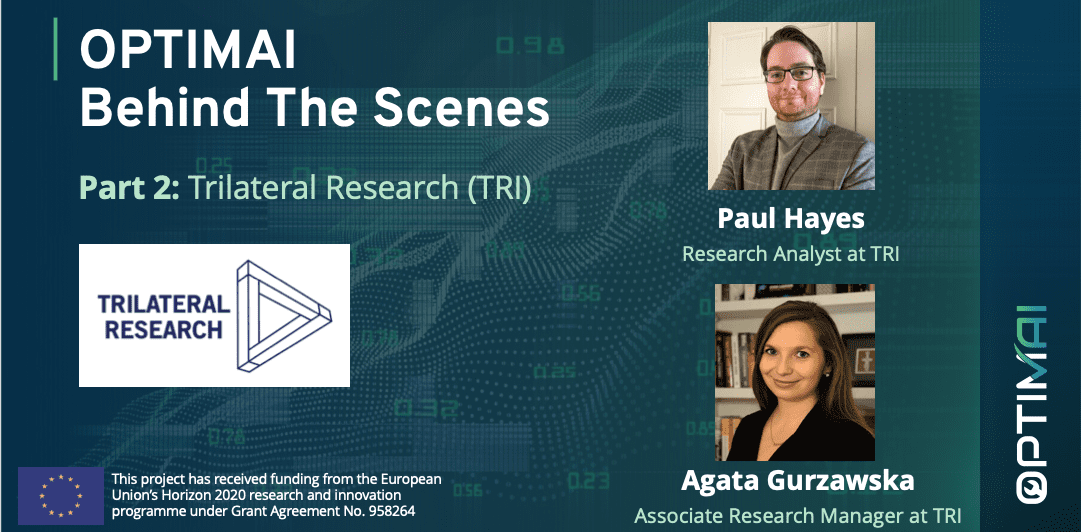
This week, we take a deep dive into the world of our partners at Trilateral Research (TRI). We spoke to Research Analyst, Paul Hayes and Associate Research Manager, Agata Gurzawska about their experience in the areas of privacy and ethics, and why their work is crucial to the OPTIMAI project.
Hi Paul, hi Agata! Thanks for speaking to us today. Could you start by introducing yourself and telling us where you are based?
We are Paul Hayes, Research Analyst and Agata Gurzawska, Associate Research Manager at Trilateral Research, which is an SME operating in the UK and Ireland. Trilateral specialises in the provision of policy and regulatory advice, particularly regarding ethics, human rights and data protection, as well as in the development of data-driven technologies.
What does your typical working day in the OPTIMAI project involve?
At Trilateral, we collaborate with our colleagues in UAB primarily on Work Package 9 which deals with managing ethical and legal matters. A typical workday can consist of a variety of different tasks depending on the time of year or phase of the project. At Trilateral, we provide a lot of day-to-day requests about and guidance on data protection issues, including collaborating on privacy policies for example. Our ongoing ad-hoc monitoring and guidance on ethics and data protection requires a lot of bilateral and multilateral communication with partners—being available and open to queries, and being present at workshops and meetings where we can together build an overview of the tools in development and identify ethical and legal risks and mitigation strategies. At the moment, we are working towards a deliverable that concerns the identification of ethical and legal risks in the project
What is unique about OPTIMAI in your opinion?
OPTIMAI is concerned with the development of an innovative data-driven manufacturing eco-system. The unique interplay of the technologies and tools under development holds great promise for zero-defect manufacturing and decision support.
What makes your organisation ideal for participating in the research/activities of OPTIMAI?
Trilateral has years of experience in contributing to responsible research and innovation, and is well situated to collaborate with our partners towards the research and development of human-centred and sustainable novel technologies.
What do you see as the biggest challenge for OPTIMAI?
Understandably, working on an international project involving many countries in the midst of a pandemic presents many logistical and communications challenges, but the project has adapted effectively to these challenges.
What does OPTIMAI have in common with other EU-funded research projects?
Like many other EU-funded projects, OPTIMAI seeks to fill technological gaps in a responsible manner that can contribute positively not only to the economy but to human well-being and the environment.
What is one key thing you have learned from working on OPTIMAI so far?
There are many great opportunities for complimenting manufacturing processes using data-driven technologies that can potentially see concrete increases in efficiency and reduction of waste.
Could you describe the overall expected impact of the OPTIMAI project in three words?
Responsible, innovative, and sustainable.
What would be your advice to anyone interested in getting involved with a Horizon Europe project?
One of the most important things on a Horizon Europe Project is to collaborate as equals with your consortium partners. A successful project emerges from the steady and methodical cooperation of individuals with a variety of different but complementary skill-sets and backgrounds working towards a common goal.
Thank you both for taking the time to speak to us! We look forward to more updates from the team at TRI.
To keep up to date with the Behind the Scenes series and all OPTIMAI updates, make sure to follow us on Twitter, LinkedIn and YouTube.

